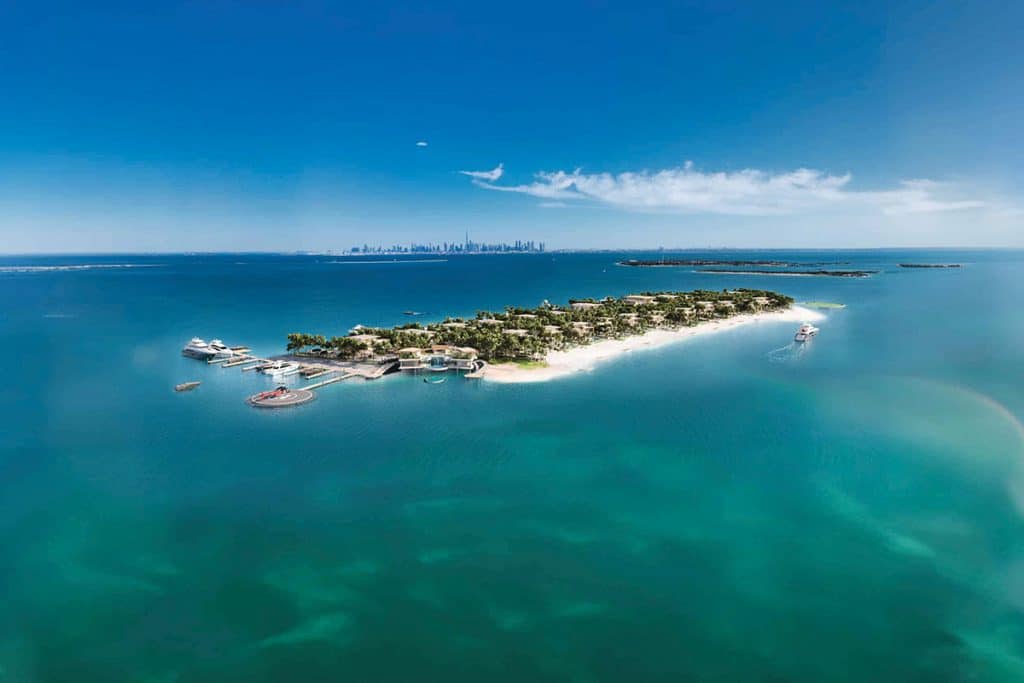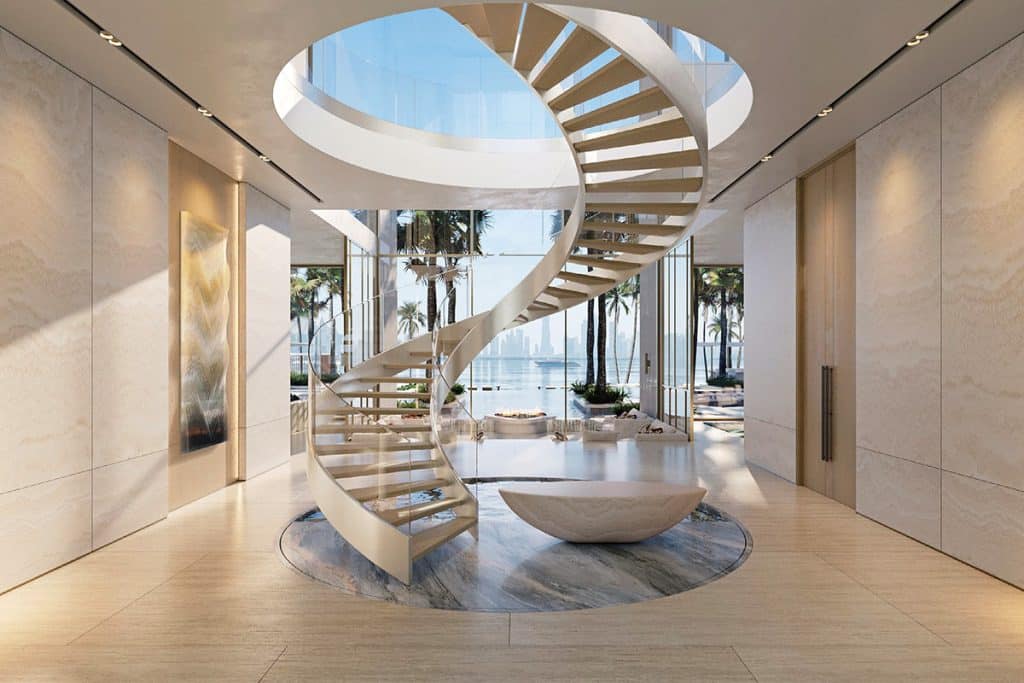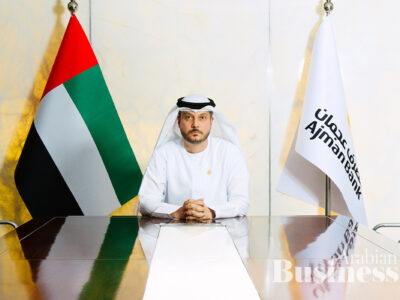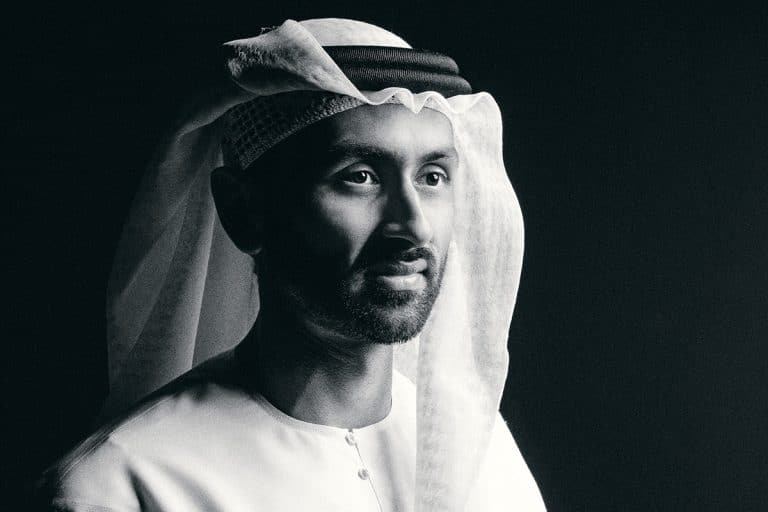In the glittering expanse of Dubai’s ever-burgeoning skyline, one name resonates with a daring ambition and an unwavering determination to defy conventions: Ali Sajwani.
Born into the renowned Sajwani family, whose imprint is emblazoned across the city’s iconic skyline through the real estate titan DAMAC Properties under the leadership of his billionaire father Hussain Sajwani, Ali has carved a path that defies the norms of the industry he was raised in.
His foray into the world of business began at a tender age, shaped by the traditions of a close-knit family steeped in entrepreneurial prowess. “We grew up with it,” he recalls, reminiscing about the weekly product launches at the iconic Madinat Jumeirah, where he found himself delivering speeches at the mere age of 13, much to the amusement of his friends.
“It got to a point where my friends would come with me to the launch. I’d do the launch and then I was allowed to go out with them.”
Sajwani was already dabbling in investments and reading balance sheets and income statements as early as nine years old, or as he would call it “old enough.”
This early immersion in the family trade instilled in Sajwani a meticulous attention to detail – a trait that would later become his guiding compass, honed by the unconventional parenting approach of his father, Hussain Sajwani, the visionary founder of DAMAC Properties and a billionaire magnate worth an estimated $5.1bn.
A fearless embrace of risk

Sajwani’s journey has been marked by a fearless embrace of risks, a trait that transcends the realm of business and permeates his personal pursuits – a daring spirit he fondly recalls sharing with his sister, Amira, during their formative years.
“I’m an adrenaline junkie,” he confesses, “I love diving with big sharks. So I travelled all around the world diving with tiger sharks, blue sharks – not cage diving, diving in the open sea with them.”
“I’m a big risk taker. When you risk your own body, it shows you the amount of risk you’re willing to take, so taking risks in business becomes easy when you’re willing to dive with sharks.”
This boldness, coupled with an unshakable trust in his instincts, has propelled him to navigate uncharted territories, both figuratively and literally.
“Business teaches us all about risks. Every successful businessman has gone bankrupt multiple times – my father a few times,” he says.
“Always go with your gut – that’s what my dad always taught us. If the whole world stands against you, but your gut tells you something, go with your gut, because it’s the minority of people who are successful in life, not the majority.”
Reviving Dubai’s forgotten World Islands
The boldest manifestation of Sajwani’s grand vision is embodied in Amali Properties’ ambitious project on the World Islands – a venture that many had written off as a pipe dream, but one that he pursued in lockstep with his sister and business partner, Amira.
“We said if we’re going to do something on our own, it’s not going to be your typical project. We want to show Dubai and the world that we can do something truly unique,” he declares, recounting the arduous journey of securing the prime location amidst a labyrinth of legal and logistical hurdles.

The location of the Amali project was critical according to Sajwani, who exhaustively scouted the World Islands to find the perfect spot.
“When I was looking for land in the World Islands, we were looking for lands everywhere in Dubai, but I actually took a boat, went into the World Islands and I stood on every single Island whether for sale or not for sale just to see the views.”
He fell in love with the views from Uruguay and Sao Paulo islands. “When I stood on these islands, I said these are the islands. The view was really unbelievable from there.”
However, acquiring the two islands posed major challenges that Sajwani painstakingly overcame. “The bigger island I think was Sao Paulo if I’m not mistaken, which was owned by a gentleman who has not been to Dubai in eight or nine years, couldn’t come to Dubai, and was sitting in Pakistan. So POA was tough.”
The other, smaller island “was a simple acquisition, which was owned by a Qatari company, they wanted to sell but that island was useless on its own without the neighbouring plot because we needed to merge them.”
With Sao Paulo, “the land was owned by a company registered in the British Virgin Islands and had been expired for nine years. And after five years of a company being expired, they dissolved the company. So I sent someone to the British Virgin Islands to try to reinstate the company and get a court order.” Despite the tribulations, Sajwani persisted, stating, “I am not going to get any island in the World Islands other than this island that that I’ve seen. It was stunning. And I think it was worth it.”
For Sajwani, the allure of the extraordinary outweighed the risks, a conviction solidified by a serendipitous moment with his British wife, Bianca.
“She looks at me and she says, why don’t you call it Amali?”
“I was on the phone with Amira. Bianca was saying why don’t we call the company Amali? It’s a beautiful name … So I sat there. I thought, wow, it started by her saying Amira and Ali and combining it. And what a coincidence, it’s a beautiful Arabic name, Amali, and it just clicked then we picked the name.”

The result of this collaborative effort? A masterpiece of exclusivity on the Dubai World Islands of Uruguay and Sao Paulo, where residents can dock their boats mere steps away from their private villas – a feat unmatched in the entirety of Dubai’s luxury real estate offerings, according to Sajwani.
“If you look at our villas in the World Islands, there is no project in all of Dubai, where you can park your boat right in front of your villa. Not a single one,” Sajwani proudly proclaims, hinting at the audacious innovations that lie ahead.
With 19 of the 24 beachfront mansions already sold, and the remaining villas commanding price tags upwards of $13.6m, the Amali Island development is poised to breathe new life into the long-stagnant World Islands project.
“When we were designing the project, everyone who heard we’re doing the project in the World Islands would think we’re crazy. They’re like: Why are you going to the 20-year-old World Islands? It’s 20 times more complicated to build there!”
But that didn’t stop them. The project’s total sales value currently stands at around AED2bn ($544.5m).
A philosophy rooted in passion and perseverance
Sajwani’s relentless pursuit of uniqueness extends beyond Amali, serving as a guiding principle for his future endeavours, fuelled by the unwavering support of his family – a dynamic that, despite their success, occasionally draws gentle reproach from his mother.
“The person who gets really frustrated is my mother, because every time we sit down for any meal, by default it goes to business,” he laughs, recounting their futile attempt to institute a “no-business” dinner, which swiftly devolved into an uncanny silence as the family struggled to find alternative conversation topics.
Yet, amidst the whirlwind of success and ambition, Sajwani remains grounded in a philosophy that extends beyond the material trappings of wealth.
“You have to enjoy what you’re doing. If you enjoy what you’re doing and you dedicate yourself to it, the money follows on its own,” he professes, distilling the essence of his leadership philosophy – a mantra that echoes the sage counsel of his father during his formative years, when a modest allowance instilled in him an entrepreneurial spirit from a tender age.

His entrepreneurial spirit was evident even as a teenager. “I remember when I was 13 years old in school, I used to buy and sell mobile numbers because I needed to make money. I had AED500 a month of allowance… I ended up making more money in one month than I would do with one year of my allowance. But that’s how you start. You have to start at a young age. That’s how you get that sort of instinct, you know, the street hustle, you learn how to sell.”
Where family businesses fail
As Sajwani looks towards the future, his vision extends beyond the confines of his own ventures. He harbours a deep conviction in the importance of nurturing the next generation of entrepreneurs, instilling in them the values of merit and unwavering dedication that have been the bedrock of his family’s success – values he is already imparting to his young son through their playful exchanges.
“My son is two and a half. He comes into the office with me. He doesn’t understand, but he comes and sits in the meetings, makes a lot of noise, and I don’t tell him off. I let him make his noise because it’s important. He realises that I need to go to work to buy him more toys, that’s why you need to make money,” he shares.
“When you ingrain this from a young age, they understand it,” he muses.
Most family businesses fail by the third generation, he says. “I think… 80 percent.”
“From what I’ve seen in the region… one of the main reasons is people are appointed not based on merit, just based on their last name. Most of the family businesses just appoint people into senior positions within the family without them having experience and that’s where these families end up failing,” he explains.
Sajwani cites the Saudi conglomerate Fawaz Abdulaziz Alhokair Group and its founder Fawaz Alhokair as an example
of a family business that has successfully navigated generational transitions by prioritising merit over nepotism. He also points to the Seddiqi family in Dubai as a model for cultivating homegrown talent within the ranks based on ability rather than birthright.
“If you’re coming from such a successful family, those genes pass on to you, you have the capability, so kids need to be involved at a young age,” he says.
“No one is going to work for a business like the owners of the business. There’s no CEO who can come and do the job that a family member CEO can do because they put their heart into it, this is their livelihood.”
Ali Sajwani has forged his own path, driven by a strong family foundation, resilience, and an unwavering pursuit of remarkable projects. As he leaves a mark on Dubai’s real estate industry – with grander plans on the horizon – he inspires a new generation to embrace risks and venture into uncharted territories, mirroring his own daring journey into the World Islands.
Yet, his next destination remains shrouded in mystery, akin to the secrets of the depths he has explored. The artificial islands he has now claimed will host lavish villas and superyachts, but the undercurrents of Sajwani’s ambition run profound. The only certainty seems to be the possibility of achieving what once appeared impossible, bending to the force of one man’s conviction.






